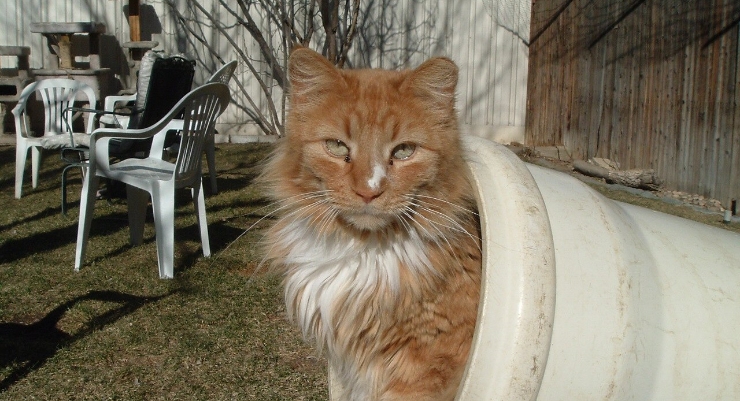
Well, I’m fostering kittens again. The 4 furry characters living in Zeke’s old room — Milo, Pip, Mr. Rochester and Oblio — got separated from their mother. So, in the meantime they’ve decided that I’ll do as a substitute.
This means they greet me excitedly as the Bearer of Food, teethe on my toes and use my legs as scratching posts.
Mother-Cat Love
In theory, the Gang of 4 should still be with their mother. They are 6 weeks old, and she would just be starting to wean them.
Most mama cats are devoted to their offspring, constantly bathing them and licking their anuses to encourage elimination. They even, ahem, ingest the feces — a throwback to when all cats were wild and when leaving droppings around would only have alerted predators to the kittens’ presence. And we human mothers think we have it tough!
Mother cats are life coaches, preparing their kittens for a world that must seem staggeringly large to their round, blue eyes (all kittens start off with blue eyes). They teach them all the skills they will need for hunting and defending themselves.
“In general, it is first and foremost from their mother that small cats learn everything,” says author and veterinarian Ferdinand Mery. “The mother cat does not abandon her kittens when they are weaned. From her … encouragements, the kittens receive a very complete education.”
Meet the New Mom Cat
But what happens when a kitten loses or leaves mom?
Well, that depends on the age. A reputable, responsible breeder won’t let any kittens leave the cattery before they’re 12 weeks old. Some will even wait 16 weeks.
“I think the longer, the better,” a Abyssinian cat breeder told me. By then, they have learned all the tricks mom has to teach and have been socialized enough to have less of a bumpy ride leaving home.
The kittens may, as writer Kitty Angell says, “appear distressed and may eat less for a few days following separation from their mothers and siblings. However, successfully incorporating kittens into their new homes is less stressful at this age than if they were separated at a younger age.”
Gradually, a kitten will simply transfer the feeling she had for her mom to her brand-new human(s). By the time she’s 1 year old, she will in fact have forgotten both mom and littermates — unless, of course, some of the latter come with her.
The kitten will, according to Dr. Nicholas Dodman, “come to view human family members as its family. Each family member may play a different role in the relationships that develop. The well-treated kitten laps it all up, positively radiating affection and trust.”
In other words, you represent food, love and safety. And that, in the kitten’s by-now-changing eyes, makes you its new mother.
Same as the Old Mom Cat?
If the kittens are very young, they are going to need you to do a lot of mom stuff, such as:
1. Bottle-Feeding
Zeke did this when he was fostering kittens a few summers ago. Now the Gang of 4 had just graduated to a mixture of canned kitten food and Kitten Milk Replacer (KMR) before they arrived.
However, Susan Graham of Aksum Abyssinians advises strongly against it, saying there’s “no reason for transition ‘needs.’ Just canned food should be fine.”
2. Cleanup
Remember all that butt-licking that mom cat had to do? Well, you’ve got it easy — a warm, wet washcloth does the trick just as well. With slightly older kittens who have just started using the litter box, you may have to take paw in hand and teach a proper scuff-scuff-scuffing technique.
3. Play
The Gang of 4 was bewildered by toys during their first week and needed a little coaching. Now they’re batting that wooden spool and carrying the toy mice around like real prey. Their real mom would be proud.
4. Handling and TLC
The kittens need these more than anything — to thrive and to be ready for their new homes.
Although you may think your cat or kitten views you as a mother, there are other viewpoints asserting that cats simply use the social behavior they already know. John Bradshaw, an expert in cat behavior from the University of Bristol, told National Geographic:
“We’ve yet to discover anything about cat behavior that suggests they have a separate box they put us in when they’re socializing with us. They obviously know we’re bigger than them, but they don’t seem to have adapted their social behavior much. Putting their tails up in the air, rubbing around our legs and sitting beside us and grooming us are exactly what cats do to each other.”


